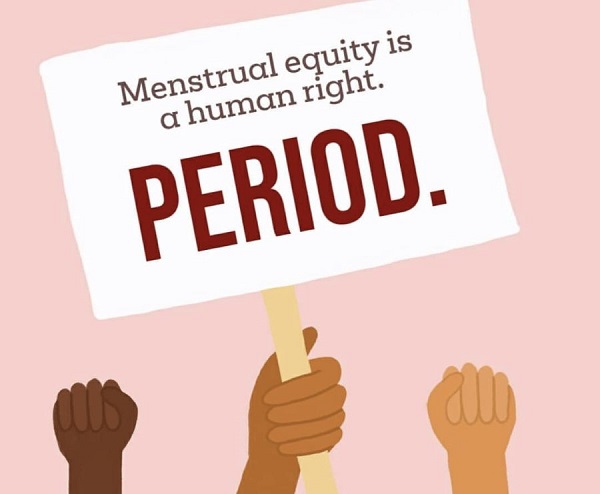One disturbing issue about advocacy in Ghana is that it often fails to push for autonomous, sustainable change in society.
That stagnancy has characterised the cries to tackle menstruation poverty in the country.
It is difficult to gauge advocates’ real objectives from the solutions they offer, which solutions currently defy the socio-economic realities of the country.
On Monday, May 29, 2023, there were pleas from advocacy groups to end menstruation poverty. The old cries of reducing and subsidising tax on imported sanitary pads were rehashed. There was a new call on the Government to set up a factory to produce sanitary pads locally to counter the rising cost of imported ones.
Characterising the calls were gestures of distributing free sanitary pads to school children. The uneasy part is that the gesture, though humanitarian, endorses a dependency mentality. It is only a short-term measure since there might be no free distribution next month. Also, girls may use more than one packet in a month. Most importantly, free distribution has reduced long-term economic feasibility.
Definitely, it is time to explore autonomous but sustainable solutions to the growing problem of menstruation poverty. That calls for a multi-sectoral approach, which can effectively counter existing corporate market monopolies. There should be a holistic approach which simultaneously explores individual and entrepreneurial initiatives to balance the wide needs of menstruating females.
The calls for the reduction or subsidisation of tax on sanitary pads and the establishment of a local pad factory all have one pitfall. Government! The current vulnerable economy implies that Government might take a long time to adhere to the calls. Coerced adherence might become an election gimmick that might not be sustained. Setting up a sanitary pad factory might take a large toll on an economy in need of intentional assistance. The initiative might take off only to lull. Therefore, an all-hands-on-deck approach – high private sector involvement – is imperative.
On the same Monday, the BBC featured Tamara, a young woman in South Africa who is producing sanitary pads for free distribution among poor girls in her community. She had suffered embarrassment while growing up because her mother could not afford sanitary pads. She could miss school for a week while she waited for her cycle to end. She aims to prevent other girls from the same agonising experience, hence, her initiative.
I applaud Tamara’s humanitarian efforts, but she could also entrench beneficiaries’ dependency mentality. An NGO in Uganda has taught girls in some communities to use local materials to make their own reusable sanitary pads. The girls no longer miss school during menstruation. Additionally, they have secured females-only washroom cubicles where girls can change in dignity.
I advocate a similar autonomous approach to female empowerment and entrepreneurship. There are local materials that can be harnessed for the safe production of sanitary pads or re-useable towels, for individual and commercial purposes. Currently, there are re-useable towels in the system.
Making Education Count
Consistently, in Ghana, we have failed to make education work for advancement in many socio-cultural, economic and geopolitical endeavours. Knowledge is meant to be applied, but that tends not to apply to the community and country of Ghana. That ought to change.
Rectifying menstruation poverty in Ghana implies strategising local solutions to local problems. Knowledgeable people from various sectors must join hands to develop effective approaches. Researchers, textiles and fashion experts can suggest local, environmentally friendly raw materials. Biodegradable pads would not pollute the environment. For ownership, schoolgirls across learning levels could be solicited for sanitary pads and towel designs.
Researchers could collaborate to explore the safest materials for pad manufacture. Considering the closeness of worn pads to the most intimate part of females, one would want to pre-empt any infection or adverse outcomes from the use of locally manufactured sanitary materials. Quality research would aid quality products that would protect, rather than compromise, the health of users.
At the junior and secondary schools respectively, female Pre-tech and Visual Arts teachers could join the collaboration, alongside their girls, to research local materials to design sanitary pads. Frugal processes could enhance affordability.
However, no local effort should free parents/guardians from the responsibility of providing sanitary materials for their girls. Parental negligence should attract a monthly fine of two packets of pads, strictly monitored by the Social Welfare and Gender Desks at the education offices. Of course, responsibility begins with people ensuring that they have the means to cater for children before they give birth.
Using this channel, I invite all proactive Ghanaians who desire to contribute knowledge/skills to minimise or end menstruation poverty to join my advocacy. Join a local initiative to empower females through dignity and autonomy. Together, we can explore effective, dignifying and sustainable solutions to a female biological challenge! (http://achielives.blogspot.com)
The writer is a Sr Lecturer, Language and Communication Skills, Takoradi Technical University,
Takoradi. E-mail :sad426@hotmail.com

